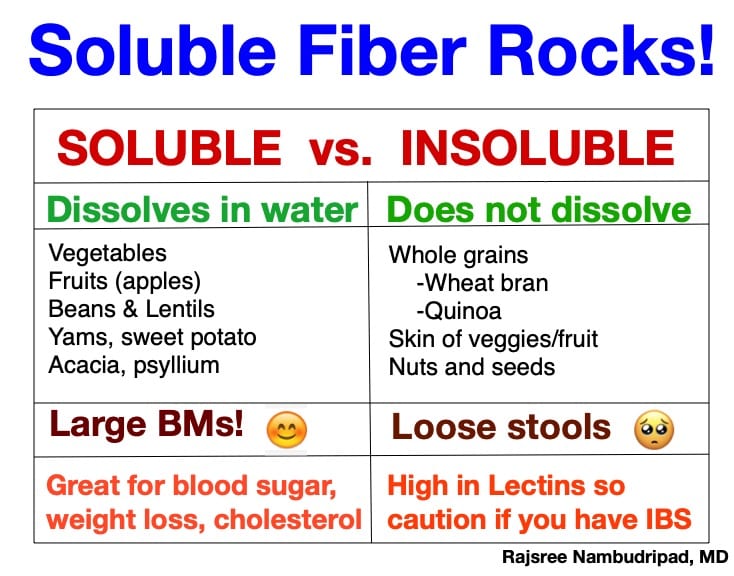
Are you getting enough fiber (roughage) in your diet? Fiber is SO important for optimal health! Fiber feeds the good bacteria in your MICROBIOME (bacterial ecosystem of your gut). Most people need 25-50 grams of fiber a day. Fiber has so many health benefits including:
1) Keeps you full
2) Stabilizes your blood sugars
3) Keeps your bowel movements regular!
4) Helps reduce cholesterol
5) Keeps you at a healthy weight
6) Promotes a healthy gut Microbiome –> Better overall health!
Do you know the difference between soluble and insoluble fiber? Soluble fiber dissolves in water and turns into a gel-like substance. It helps bulk up your stools so you have nice big bowel movements! Don’t we all feel better after having a big morning bowel movement? :) Soluble fiber is prebiotics that feed all the good bacteria in your gut! Best way to get enough fiber is through a whole foods diet high in vegetables and some fruit. Maybe that’s what they say “an apple a day keeps the doctor away!” Yams and sweet potatoes have great soluble fiber and resistant starches.
If you need to take a fiber supplement, my favorite is Acacia Senegalfiber (Heather’s brand), since it does not cause bloating or abdominal pain. It dissolves easily in water and has no taste! It is considered a low FODMAP fiber so also safe in patients with SIBO (Small Intestine Bacterial Overgrowth). Psyllium is another good option but sometimes causes bloating. Be sure to buy pure psyllium and not Metamucil brand which has other added chemical ingredients. With all fibers (diet and supplements), it is important to gradually increase your dose by 2-3 grams per day. If you are not eating much vegetables, gradually increase the amount you eat, aiming for one pound of day! Follow the same principle with fiber supplements — increase the dose gradually until you are having nice bowel movements. This allows your gut microbiome time to adjust so you won’t experience pain or bloating.
Insoluble fiber does not dissolve in water. It is found in the outer coating of whole grains (like wheat bran, brown rice, quinoa, barley, etc) as well as the outer coating of nuts, seeds, and vegetables. It is high in LECTINS — which is the outer protective coating for the plant that can be hard to digest and break down for some people. For patients with Irritable Bowel Syndrome (IBS), Inflammatory Bowel Disease (IBD), loose stools, abdominal pain issues, or autoimmune disease, this can be a problem. Lectins sometimes cause gut inflammation for these people leading to systemic inflammation.
Most foods are not 100% black and white as far as soluble or insoluble fiber…. Most vegetables and oatmeal, for example, contain both soluble and insoluble fiber. Ground flax has insoluble fiber on the outside coating, and soluble fiber on the inside. Living in California, you’ll be happy to know avocados are a rich source of fiber (both soluble and insoluble). Your gut microbiome does need some of both, but pay attention to how you feel with soluble vs. insoluble fiber to see which one is best for you!
Beans are interesting because they are a great source of soluble fiber but the tricky part is they have lectins which can make it hard for some people to digest. Again, listen to your body to know if you can digest beans. Sometimes cooking them with a pressure cooker or taking a digestive enzyme can make it easier for your gut to handle beans.
Does cooking affecting the fiber content in foods? No! The grams of fiber in the foods remains the same. So feel free to cook your vegetables if it is easier for you to digest. Raw smoothies and salads are great for some people, but not for everyone! Listen to your body.
Lastly, have you heard of glucomannan? This is a fiber extracted from the konjac root. It has amazing properties of expanding in the stomach and turning into a large gel-like substance. If you take a glucomannan supplement with a large glass of water 30 min before meals, it is great for curbing hunger, improving satiety, and promoting weight loss.
In summary, SOLUBLE FIBER IS YOUR FRIEND! If you are struggling with hunger or weight issues, definitely increase the fiber in your diet! Fiber will improve the health of your gut microbiome, leading to better health from the inside out.
Warmly,
Rajsree Nambudripad, MD











 Dr. Rajsree is a caring and compassionate physician, who is board-certified in both Internal Medicine and Integrative/Holistic medicine. She is passionate about helping patients optimize their health through a preventative approach involving healthy lifestyle, dietary changes, targeted nutritional supplementation, and optimizing hormones. Her practice is unique in the personalized attention she devotes to each and every patient.
Dr. Rajsree is a caring and compassionate physician, who is board-certified in both Internal Medicine and Integrative/Holistic medicine. She is passionate about helping patients optimize their health through a preventative approach involving healthy lifestyle, dietary changes, targeted nutritional supplementation, and optimizing hormones. Her practice is unique in the personalized attention she devotes to each and every patient.